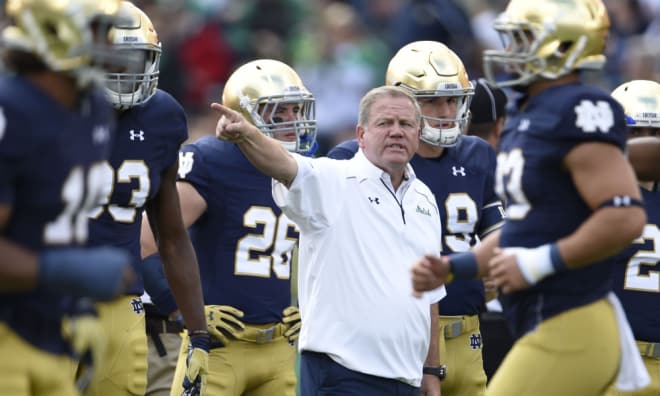Notre Dame Highlights What Did (And Didn’t) Contribute To COVID-19 Outbreak
Notre Dame head athletic trainer Rob Hunt made dueling confirmations in a Thursday press conference.
Hunt revealed what caused Notre Dame football’s COVID-19 outbreak, and one item that didn’t. Shortly after, head coach Brian Kelly followed with another area that proved not to be a problem.
Notre Dame determined the virus spread through a pregame meal before the Sept. 19 game against South Florida and a drop in attentiveness to basic protocols like mask-wearing in the locker room, among other things, per Hunt.

Those are disappointing revelations that indicate a less-than-stellar job combating the virus, but correctable ones. An outbreak caused by controllable lapses feels less daunting than one that popped up amid air-tight protocols with perfect adherence.
The intrigue — and perhaps more importantly optimism — lies in events that did not facilitate the outbreak. Hunt said player interactions with their families on game week was not a source of infection or spread. No family members were symptomatic before or after visiting, and none appear to have become infected from interactions with players.
“That was one of my biggest concerns prior to the start of the season,” Hunt said. “It was a new group of people we were bringing into our tight-knit group.”
But more importantly, Kelly confirmed there was no detectable on-field spread from an already infected Notre Dame team to USF.
Per Kelly, USF had no positive tests in the days following its visit to Notre Dame. Evidence of on-field transmission would have cast a pall over the hope of completing a season. Instead, Notre Dame’s focus can rest solely on how to prevent spread within its ranks. Its opponents can say the same. Cases discovered after the game won’t automatically usher in the harrowing thought about an inevitable opponent outbreak.
“As it relates to the on-field spread, in that instance, there was some chance there it could have spread, and it did not,” Kelly said. “The way the game is played, where there is not the duration of contact over a long period of time, it minimizes the spread.
“It appears that way. I’m not an expert. All we’re doing is picking up a lot of these trends as we see them, and that seems to be the case right now. Stay tuned. We’ll see.”
As long as it is, there’s reasonable optimism surrounding this season’s viability. Notre Dame had players in the game against USF who were likely exposed to the virus before the game and tested positive two days later, yet tested negative the day before. In and of itself, that’s a scary thought, even if their viral load was not very high when they were tested or during the game.
Furthermore, Hunt isn’t entirely sure the contact tracing from the day before the USF game weeded out everyone it needed to.
“It’s speculative and a guess, but it’s an educated guess that allowed some of those guys to test positive Monday,” Hunt said. “It certainly shows a source of potential concern for us moving forward.”
The apparent lack of on-field spread to USF lessens such concern from doomsday to something below that. It’s still not at all ideal to have instances of incomplete tracing or yet-to-be-discovered positive cases playing in a game, but so far, evidence suggests such slip-ups won’t be catastrophic and harm multiple teams.
As with anything regarding COVID-19, that’s subject to change.
“That would make this almost untenable if you were worried about on-field spread,” Kelly said.
The amount of cases Notre Dame had, or anything remotely close to it, is reason for alarm, though. A lack of evidence of on-field transmission isn’t reason to push forward if cases within a team climb too high or are uncontrolled. At the Notre Dame outbreak’s peak, 39 players were either in isolation due to testing positive or in quarantine after contact tracing identified possible exposure.
All told, the Sept. 22 decision to pause practices and postpone the Sept. 26 game at Wake Forest was rooted in a lack of control and too many absences. When the decision was made, Notre Dame understood the latest round of positives weren’t going to be the last. And they weren’t. Eighteen more followed in the next few days, leading to one-third of the roster absent due to COVID-19 issues.
“We didn’t feel like through our testing, we had the spike under control yet,” Kelly said. “That was No. 1. Then No. 2, would we be risking an individual by playing them well beyond the threshold of the amount of plays they should be playing in the game? When we looked at one and two, that’s how we made our decision.
“Moving forward, certainly we’re in a different place, and we don’t have the kind of luxury we did earlier. But we still have to use both of those as we evaluate if something happens further.”
Notre Dame’s fixes to try and prevent another flare-up include changing the location of its pregame meals to create more space, de-densifying the locker room, increased distancing on the sideline and a stricter enforcement of mask-wearing at all times when the team is gathered but not on the field. Hunt says there will be a “zero tolerance” policy for mask infractions.
“We’re going to tighten those pieces up and have strict adherence to the policies and procedures we had prior to this outbreak,” Hunt said. “Prior to September, we had 12 or 13 positives leading into the season. Now, we’re looking at 30 positives in the month of September. We need to get back to the detailed work that we had prior.”

----
• Learn more about our print and digital publication, Blue & Gold Illustrated.
• Watch our videos and subscribe to our YouTube channel
• Sign up for Blue & Gold's news alerts and daily newsletter
• Subscribe to our podcast on iTunes
• Follow us on Twitter: @BGINews, @BGI_LouSomogyi, @Rivals_Singer, @PatrickEngel_, @MasonPlummer_ and @AndrewMentock.
• Like us on Facebook.


